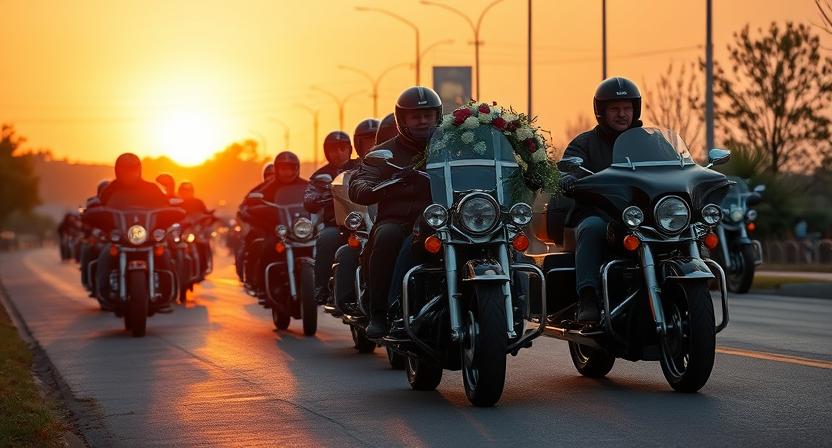Life is full of journeys. Some are physical travels across cities, countries, or continents, while others are emotional and spiritual paths that shape who we are. Among these journeys, the phrase “their last ride” evokes a sense of finality, nostalgia, and often respect. Whether used to describe a soldier’s final mission, a cowboy’s last gallop, a motorcyclist’s farewell ride, or even a symbolic passage into another chapter of life, the phrase carries deep meaning across cultures and contexts.
Table of Contents
The Meaning Behind “Their Last Ride”
The phrase “their last ride” is not limited to one specific event or setting. Instead, it holds versatile interpretations depending on the context:
- Symbol of Farewell: It often represents a person’s final journey before passing away, commonly used in memorials or tributes.
- End of a Career or Chapter: Athletes, performers, or even workers might describe retirement as “their last ride.”
- Literal Journeys: In cowboy culture or among motorcycle groups, the last ride can be a literal ride taken for the last time.
- Spiritual Transition: Many faiths and traditions see the “last ride” as the soul’s passage to the afterlife.
This flexibility makes the phrase powerful, relatable, and emotional.
Historical and Cultural Roots
1. Cowboys and the Wild West
In American cowboy tradition, “the last ride” often symbolizes a cowboy’s final journey into the sunset, representing courage, freedom, and the end of a rugged lifestyle. Western films often depicted aging cowboys saddling up for their last adventure before settling down or meeting their fate.
2. Soldiers and Warriors
For soldiers, the last ride symbolizes the ultimate sacrifice—giving one’s life in service. Military memorials sometimes include processions with horses or motorcycles, signifying a hero’s final journey.
3. Motorcyclist Culture
Among biker communities, the “last ride” is a respected tradition. When a fellow rider passes away, friends and family organize a funeral procession of motorcycles to honor their memory. The rumble of engines becomes a tribute to their passion and lifestyle.
4. Literature and Poetry
Writers and poets often use the phrase to represent endings. Whether it is a literal ride or a metaphor for death, “their last ride” creates imagery of departure, dignity, and closure.
Symbolism of the Last Ride
The idea of “their last ride” is heavy with symbolism:
- Closure: It represents the conclusion of a chapter or life.
- Honor: It pays tribute to the achievements, struggles, or sacrifices of the individual.
- Freedom: The imagery of riding—on a horse, in a car, or on a motorcycle—symbolizes freedom and independence.
- Transition: It marks a movement from one state of existence to another, whether in life or afterlife.
The Last Ride in Different Contexts
1. Retirement and Career Endings
For athletes, performers, or professionals, their final performance, game, or day at work may be called their last ride. This marks not only an end but also a celebration of dedication and hard work.
2. Farewell Journeys
Sometimes, people embark on one final trip—a last vacation, a final tour of a hometown, or a symbolic walk down memory lane—before closing a chapter in life.
3. End-of-Life Rituals
In many traditions, the deceased are honored with ceremonial rides. In rural areas, horse-drawn carriages may carry caskets, while in urban or biker communities, motorcycle escorts accompany the final journey.
4. Symbolic Media Representations
Films, songs, and books often portray a hero’s last mission or journey as their “last ride.” This trope emphasizes courage, sacrifice, and destiny.
Emotional Impact of Their Last Ride
Witnessing or reflecting on someone’s last ride can be deeply emotional. It is not always about sadness—it can also be about celebration of life, legacy, and memories.
- Families often feel comfort knowing their loved one had a dignified farewell.
- Communities find unity in honoring someone together.
- Individuals facing their own “last ride” often see it as a chance for reflection and closure.
Lessons from Their Last Ride
The phrase teaches us important life lessons:
- Every Journey Has an End: Life’s impermanence reminds us to value our moments.
- Honor and Legacy Matter: How people are remembered depends on the way they lived and treated others.
- Transitions Are Part of Growth: Endings often open the door to new beginnings.
- Celebrate While You Can: The last ride reminds us to cherish experiences before they become memories.
Frequently Asked Questions (FAQs)
Q1: What does “their last ride” mean?
A: It generally refers to someone’s final journey, whether symbolic, literal, or spiritual. It can signify retirement, passing away, or the end of a life chapter.
Q2: Is the phrase used only for death?
A: No. While it often symbolizes death, it is also used for retirements, career endings, or any final meaningful journey.
Q3: Why do motorcyclists have “last ride” processions?
A: It is a tradition to honor a deceased rider, showing respect through a procession that reflects their passion for motorcycles.
Q4: What is the cultural importance of the last ride?
A: It signifies honor, closure, remembrance, and respect across cultures, whether for cowboys, soldiers, or everyday individuals.
Q5: Can “last ride” be seen positively?
A: Yes. Although it marks an end, it is also a celebration of life, achievements, and legacy.
Conclusion
“Their last ride” is more than just a phrase—it is a universal symbol of endings, honor, and remembrance. Whether in cowboy folklore, biker traditions, or everyday life, it serves as a powerful reminder of the importance of journeys, closure, and legacy.
We all will face our own “last ride” someday, but until then, we can honor others, cherish our moments, and create memories worth celebrating when our journey reaches its final destination.

